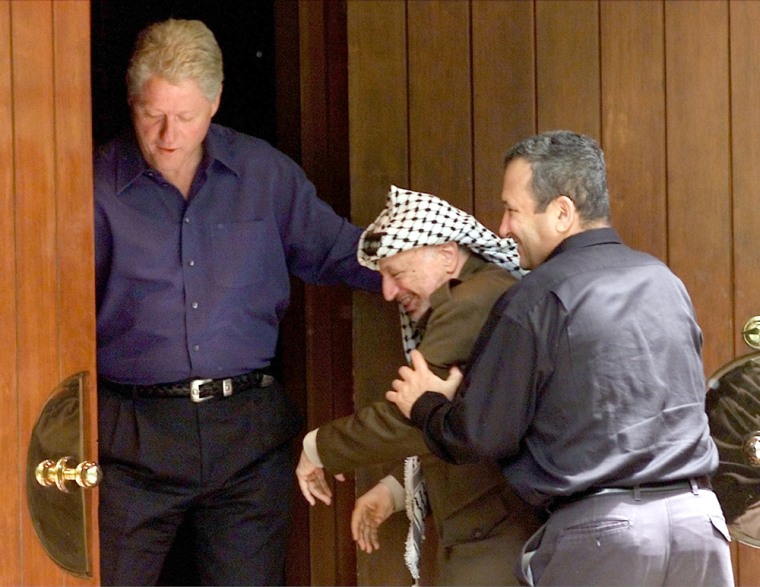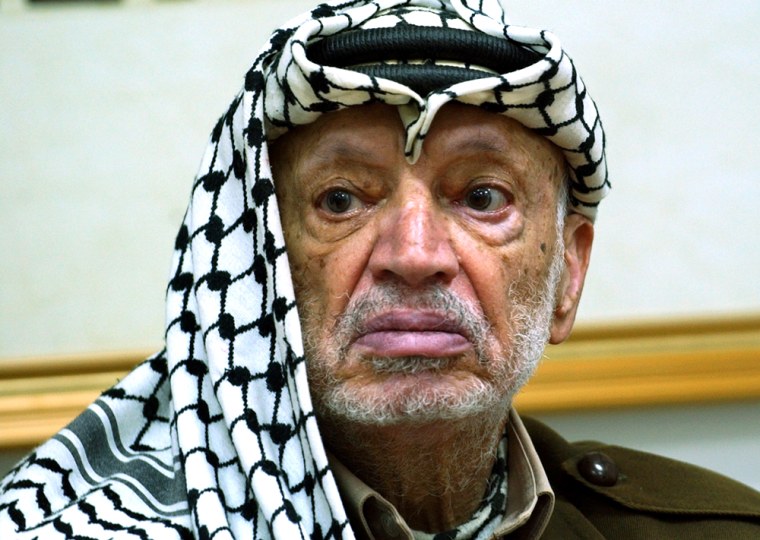Among revolutionaries, Yasser Arafat was a quintessential success story. He led a murderous armed struggle against a powerful enemy for nearly 50 years before signing a peace treaty with Israel guaranteed by the president of the United States on the lawn of the White House. But in the end, the enigmatic Arafat used a mixture of terrorism and diplomacy to forge the Palestinian question into the central issue of the Arab-Israeli conflict, and pave the way for an independent Palestinian state.
Arafat was born in Jerusalem or Cairo in 1929. His leadership credentials were honed in student politics and in the Egyptian army fighting against the newly created nation of Israel in 1948.
In 1967, after Israel's lightning victory over Arab armies, Arafat's emerging Palestine Liberation Organization began mobilizing its diaspora. Young men were drafted into guerrilla groups dedicated to military struggle. Money from Arab states poured into PLO coffers, and its soldiers were equipped with East Bloc arms. In 1969 Arafat became chairman of the PLO. Cross-border raids into Israel by PLO groups operating from neighboring Arab countries increased, and a series of airplane hijackings put Palestinians in the world spotlight.
Growing Palestinian power alarmed the Middle East. In Jordan where Palestinians were forming a state within a state, King Hussein's army expelled the PLO in 1970 after a bloody war in the streets of Amman.
Synonymous with terrorism
Arafat regrouped his forces in Lebanon and for the next decade the word Palestinian became synonymous with terrorism. Attacks against Jewish targets worldwide increased.
Arafat became a constant traveler, marshaling diplomatic support for the Palestinian cause. In 1974 he addressed the U.N. General Assembly in New York. Israel was outraged.

In Lebanon, PLO guerrillas became entangled in Lebanon's fratricidal civil war. Israel backed Lebanon's Christians against the PLO and Muslim militias. In 1982 Israel launched a full-scale invasion to crush the PLO, and Arafat was forced to abandon Beirut for Tunis.
For five years Arafat tried to rebuild the PLO from his new headquarters 1,500 miles from Palestine. Then the "Intifada" began in Israeli-occupied Gaza and the West Bank: Young Palestinians were the new Davids against Goliath Israel. International attitudes began to change as an unrelenting stream of news reports depicted stone-throwing Palestinians against Israeli guns.
Arafat crisscrossed the globe in his quest for diplomatic support in opening a dialogue with the United States and Israel. In 1988 he formally renounced terrorism, and the peace process was born.
By 1993 Arafat was ready to recognize Israel's right to exist. He signed a peace agreement with Israel which envisaged the gradual implementation of Palestinian self-rule in the West Bank and the Gaza Strip over a five-year period - the foundations for a future independent Palestinian state.
Return to Gaza after 27 years
Arafat returned to Gaza in 1994, the first time he had set foot on Palestinian soil for 27 years. He quickly set up the apparatus to give Palestinians their own parliament, their own police force, stamps and schools.
Before the end of the year he was awarded, along with Israel's leaders, the Nobel Peace Prize. The former guerrilla leader, terrorist and diplomat had become a world statesman.
In 1995 Arafat's Israeli partner in peace negotiations, Prime Minister Yitzhak Rabin, was assassinated by a Jew. By 2000, when U.S. President Bill Clinton pushed Israelis and Palestinians to the peace table for a final deal, Arafat could not reconcile outstanding differences with Israel's new Prime Minister Ehud Barak over Jerusalem and the right of Palestinian refugees to return to their homes. The peace process began unraveling.
By 2001 Israel's right-wing Prime Minister Ariel Sharon was in a position to rekindle a personal feud with Arafat going back 30 years. By tightening Israel's military grip over Palestinians on the West Bank and the Gaza Strip and degrading Arafat's security services, Sharon pressured more radical Palestinian groups to stiffen their battle for an independent state and step up terror attacks on Israeli civilians. In the unremitting cycle of violence that continues today more than a thousand Israelis and more than 3,000 Palestinians have been killed.
Confined to his Ramallah compound
In December 2001, Sharon had Arafat placed under house arrest. Since the end of 2002, Arafat remained inside his compound in the West Bank city of Ramallah, partly out of fear that Israel would detain him and force him into exile if he left, and partly because the United States, at Israel's urging, withdrew its recognition of him as leader of the Palestinian people. Arafat's health deteriorated during his isolation.
He suffered from Parkinson's disease. Recently Palestinian officials confirmed he was battling the flu and that he suffered from gallstones.
In late October, he was transported to a Paris hospital as his medical condition worsened, although the exact ailment was never made public.
Arafat was a full-time revolutionary. His tenacity was his legacy. The struggle to wrest an independent Palestinian homeland from Israel continues today.
